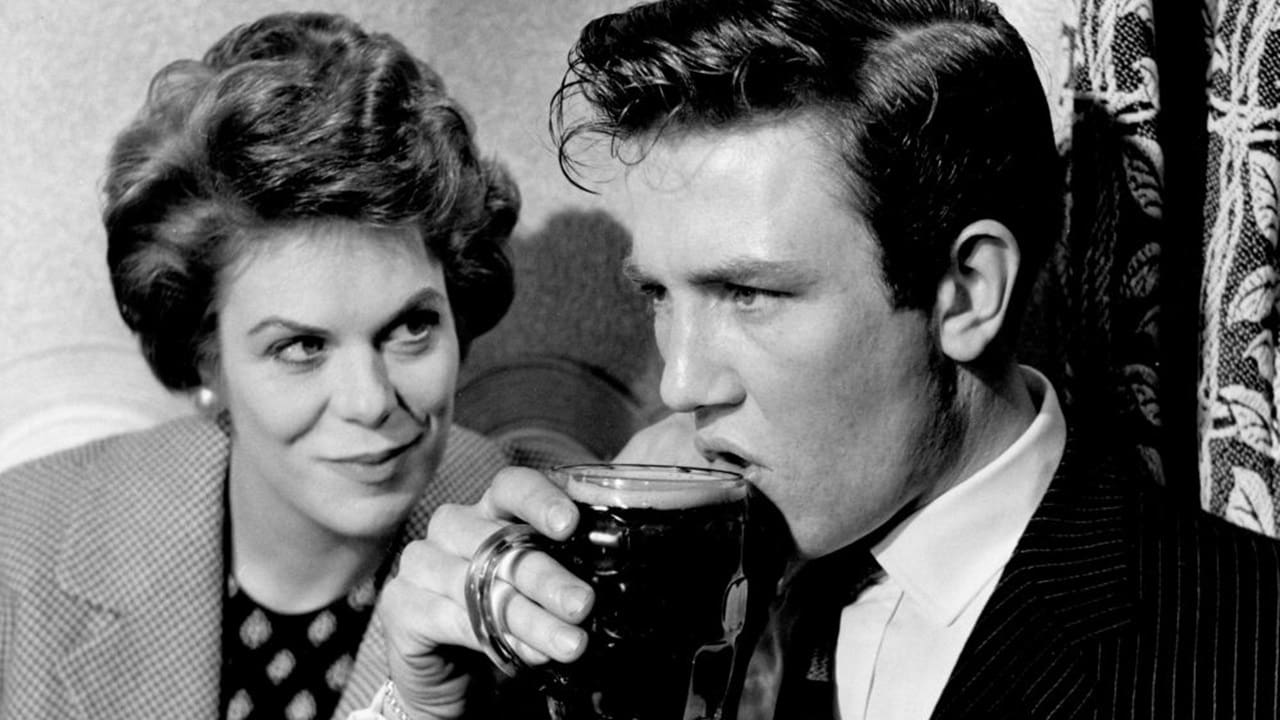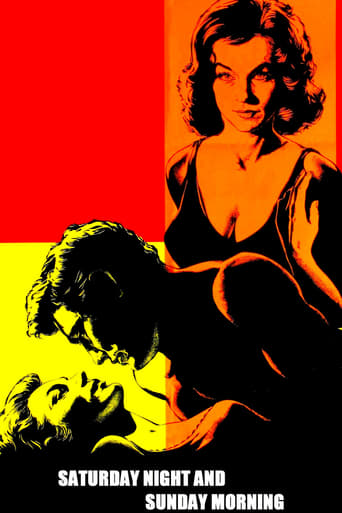

What a waste of my time!!!
... View MoreExcellent film with a gripping story!
... View MoreDisappointment for a huge fan!
... View MoreI gave this film a 9 out of 10, because it was exactly what I expected it to be.
... View MoreI saw this film when it came out, although I was under-age. The local flea-pit in Manchester wasn't too bothered about such things. It made an impression then, as my own life growing up in a big council estate was not that different. When I later went to live in Nottingham I realised even more how accurate to local Nottingham working class life the film was.Some of the other reviewers here have referred to the film as "Northern". No-one would expect detailed understanding of subtle regional differences from people outside the UK, or even outside the North and Midlands of England, but the East Midlands has a distinct character from the rest of the UK. It is not "Northern". The East Midlands has a different accent, and a different attitude to life - Nottingham is a very very working class town. It is indeed close to the Manchester culture - bossy, free thinking women, a culture of drinking to excess at the weekend etc, yet the humour is drier and sharper.I see this film whenever it comes on TV, which is rarely these days. It's one of my favourites of all time. The only thing wrong with it is Albert Finney's accent. People say nobody can do the Nottingham accent, but Albert Finney has no excuse for doing a Salford accent throughout - he went to drama college in Nottingham, although he's from Salford originally. He does all right with other accents, so why not have a go at the accent of a town he knows well. (Americans please correct me if I'm wrong).The modern equivalent would be any Shane Meadows film. He is heavily influenced by this film, and all to the good.On a personal note, as all the youngsters bemoan Brexit, this film is set in a world before the EU. Full employment and loads of money. I too worked in the Raleigh factory for a while at that time. My job was temporary (as a student) but the people there were a great laugh, and just as portrayed in the film. In real terms I earned a fortune. I should have saved it instead of spending it on having a good time, but I suppose that's why I know how accurate the film is to the period. I didn't get my friend's wife up the duff though - we had the Marie Stopes clinics even in those days.
... View MoreThe film is about working-class alienation; end of.It portrays this brilliantly in the dismal Nottingham factory setting- day after day- in a world where you have one night to put on your teddy boy suit and winkle pickers, and numb yourself stupid with alcohol (and a loose and desperate colleague's wife)- before returning to the grime of your lathe, and another 1000 bolts to make before clock-off.Finney gives a gritty performance in this monochrome time-capsule of a movie; truly shocking and immoral at the time, but nevertheless timelessly relevant to every person who truly detests the capitalist system and those who perpetuate it.A work of sociological art.
... View MoreAlbert Finney drives this film with his brilliant performance as Arthur Seaton, an angry young factory worker from Nottingham who lives for the weekend.His infectious appetite for trouble has developed a reputation for being a rogue in the terraces and ginnels of his neighbourhood. He likes the ladies, and although there are plenty of single women out there for him, he chooses to sleep with Brenda (Rachel Roberts), the wife of his workmate Jack (Bryan Pringle). A scene early in the film shows Arthur gleefully finishing breakfast at Brenda's house when Jack is moments away from walking through the door. Arthur deliberately takes his time in escaping, relishing the close shave.Opinionated and disaffected, Arthur enjoys regular rants with his close friend Bert (Norman Rossington) about the banality of the quiet life and how he has 'fight' in him. Although he dislikes authority figures and the local old bag who pokes her nose in everyone's business, the enemy that he's fighting isn't a human, his enemy is conformity, the prospect of settling down and facing the daily grind makes him very anxious and fiery indeed.This leads to an awful lot of troublemaking, which can be very funny. In one moment he loads his rudimentary pellet gun, quietly opens a window and shoots Mrs. Bull (Edna Morris), the aforementioned nosey cow, in her fat backside whilst she gossips. I laughed excitedly like a naughty adolescent as if I was really with Arthur, frightened of what the petty old hag was going to do. Inevitably, Arthur treads on some toes and he doesn't always get away scot free, the gravest example of this being a fight scene that, unsurprisingly, is very dated. However, Arthur isn't bothered by a tough fight, 'It's not the first time I've been in a losing fight, won't be the last either I don't spose I'm a fighting pit prop who wants a pint of bitter, that's me.' During a fishing trip, his friend Bert asks the ranting Arthur 'Where does all this fighting get you?' It's an important question and I don't think Arthur is sure of the answer.Arthur knows that he's following the same well-trodden path as all the old farts around him and it seems he has an existential crisis every time he considers it, but he'll probably soon mellow and learn to, in the words of Bert, 'go on working and hope something good'll turn up.' Either that or move away and do something completely different, something that breaks away from his area's cyclical nature that he detests so much.Unlike so many romantic dramas and especially comedies, the film has a romance that you genuinely care about. Arthur meets the lovely Doreen (Shirley Anne Field), a beautiful, measured and reserved woman who keeps Arthur's charm at bay, which entices him even further. You hope that the angsty, impetuous Arthur won't squander his chances of a good relationship with a good woman.Saturday Night, Sunday Morning is a epochal piece of realist British cinema that remains resonant and largely undated.85%www.hawkensian.com
... View MoreThree years before the big budget and Oscar winning Tom Jones, the actor who much later in his career starred in films like Big Fish, The Bourne Ultimatum and Skyfall got his debut in this all British film, which featured in the book 1001 Movies You Must See Before You Die, from director Karel Reisz (The French Lieutenant's Woman). Basically, set in 1960's Nottingham, young factory machinist Arthur Seaton (BAFTA winning and nominated Albert Finney) is hardworking and only gets paid modest wages, he is angry at many things in his life, including his parents, and he does not to stay living in drudgery like all around him. The wages he earns he spends at weekends on drinking and having fun, he is having an affair with the wife of an older co-worker, Brenda (BAFTA winning Rachel Roberts), and he also starts a relationship with single and nearer his age Doreen Gretton (Shirley Anne Field). Arthur's personal life takes a drastic turn on Saturday night when Brenda tells him she is pregnant with his child, Arthur asks for advice from Aunt Ada (Hylda Baker) about an abortion, but this does work out and Brenda decides to keep the child and face the consequences. Brenda's husband finds out about the affair with Arthur and being pregnant with his child, and following this he gets his brother and a fellow soldier to try and catch him and give him a severe beating, they chase him through a town carnival. After these Brenda returns to her normal life with her husband and the children, Arthur recovers and returns to working at the factory, but he knows he cannot see his mistress or to be born child again, and in the end Arthur and Doreen discuss their future, i.e. possible marriage and a new home together. Also starring Norman Rossington as Bert, Bryan Pringle as Jack, Robert Cawdron as Robboe, Edna Morris as Mrs. Bull, Elsie Wagstaff as Mrs. Seaton and Frank Pettitt as Mr. Seaton. Finney gives a great performance as the young man struggling against authority and responsibility, Roberts is terrific as the older woman who causes a big dilemma, and Field is good as the young woman unaware about his disregard. You have to keep in mind that pregnancy between a young and older person was controversial in the 1960's, and of course abortions were illegal, so there are engaging issues to keep you watching, a powerful and most interesting classic drama. It won the BAFTA for Best British Film, and it was nominated for Best British Screenplay and Best Film from any Source. Albert Finney was number 33 on The 50 Greatest British Actors, and he was number 22 on The World's Greatest Actor, and the film was number 49 on The 50 Greatest British Films. Very good!
... View More